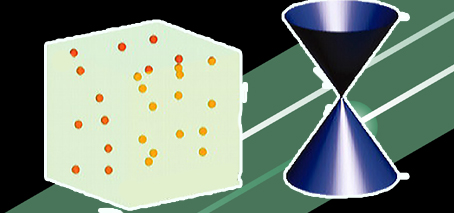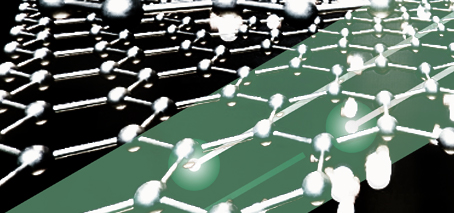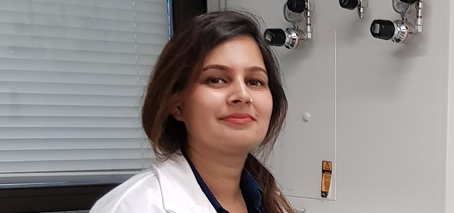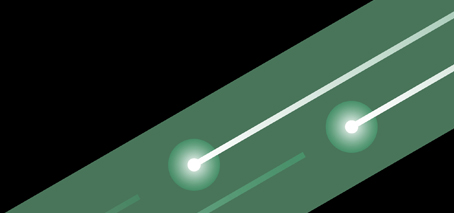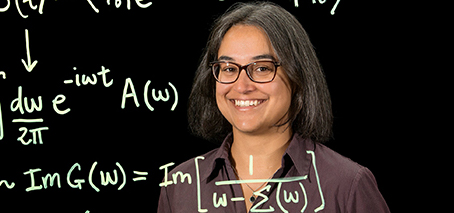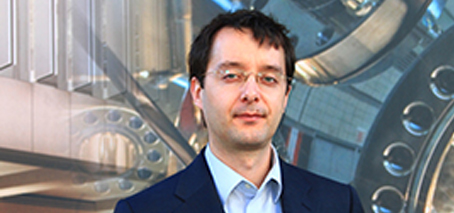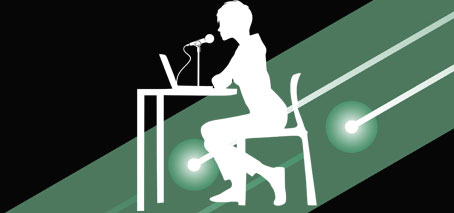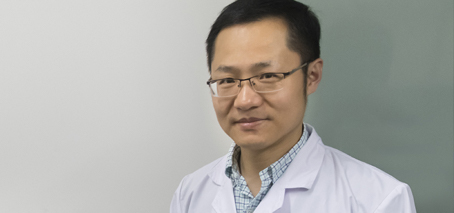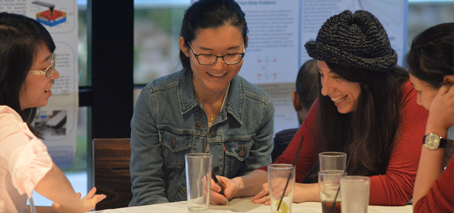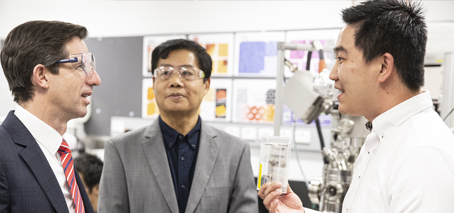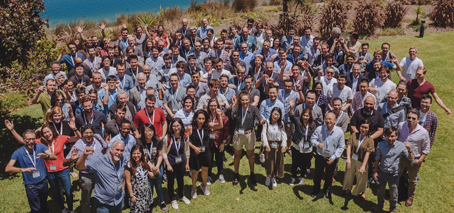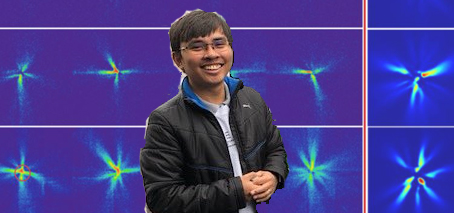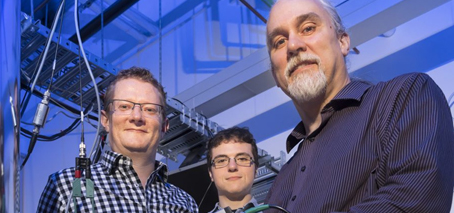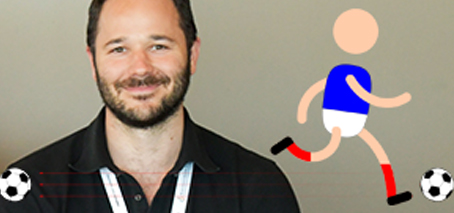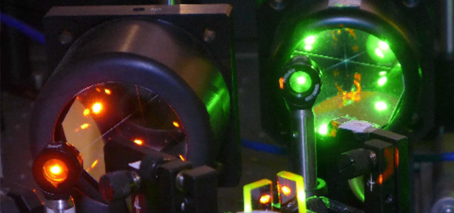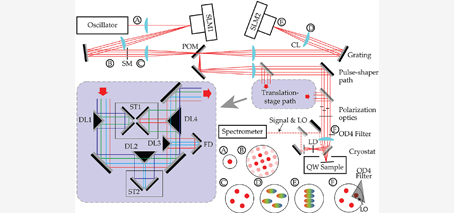We’re pleased to present hot-off-the-press FLEET ‘s 2018 Annual Report. 2018 marked the first full year of research operations at FLEET and we’d love to share the Centre’s research efforts with you in this second annual report. The web-friendly version is also available for download… For detailed lists of the centre organised events and media outputs etc, please view the 2018 Report …
FLEET collaboration reviews ferromagnetism in 2D materials
* Two-dimensional magnetism reviewed in new, collaborative review A collaborative FLEET study has reviewed recent progress in 2D ferromagnetism, and predict new, possible 2D ferromagnetic materials. The study also introduces possible applications of atomically-thin ferromagnets in novel dissipationless electronics, spintronics, and other conventional magnetic technologies. The scientists propose a new method of observing 2D ferromagnetism that could reveal new materials. …
I can’t believe it’s not graphene: nanoengineering artificial graphene
New facility improves study of ‘artificial graphene’ at FLEET ‘Like driving a new Maserati!’ The amazing electrical properties of graphene and other 2D, atomically-thin crystals are due to the symmetry of their lattice structure. For example, it is graphene’s famous ‘honeycomb’ lattice that causes electrons to act as they were massless – moving about 70 times faster than in silicon …
Three young FLEET scientists off to Lindau Nobel meeting
Three FLEET researchers have been chosen to represent Australia at the annual Lindau Nobel Laureate Meeting this year. The three FLEET researchers will among ten early-career Australian scientists attending the 69th Meeting of Nobel Laureates in Lindau, Germany, 30 June – 5 July 2019. The 69th Lindau Nobel Laureate Meeting will be dedicated to physics. To date, 42 Nobel Laureates have …
Women in FLEET Fellowships
In the Centre’s first two years, FLEET’s recruitment had drawn from the existing physics pool, which (along with related fields such as engineering and material science) unfortunately features a relatively low percentage of women. Women in FLEET Fellowships were conceived as a way to allow the Centre to begin to increase the percentage of women above the average in these …
Meera Parish named APS 2019 Outstanding Referee
FLEET’s Meera Parish has been named 2019 Outstanding Referee, the only one in Australia, by the influential American Physical Society (APS). The APS selected 143 Outstanding Referees for 2019, each of whom have demonstrated exceptional work in the assessment of manuscripts submitted to the Physical Review journals. The Outstanding Referee program recognises approximately 150 currently active referees each year, and …
Climate rewind: Scientists turn carbon dioxide back into coal
Researchers have used liquid metals to turn carbon dioxide back into solid coal, in a world-first breakthrough that could transform our approach to carbon capture and storage. The research team led by RMIT University in Melbourne, Australia, have developed a new technique that can efficiently convert CO2 from a gas into solid particles of carbon. Published in the journal Nature …
Topological defects could be key to future nano-electronics
• Ferroic and multiferroic topological structures offer exciting potential in future nanoelectronics • Commentary piece published this week in Nature Materials The connection from fridge magnets to cutting edge materials science is shorter than what one might expect. The reason why a magnet sticks to your fridge is that electronic spins or magnetic moments in the magnetic material spontaneously align …
Networking and skills development: Canberra Summer School
Recognising the increasing importance of topological physics, FLEET helped run the 2018 Canberra International Physics Summer School on Topological Matter at ANU – a great opportunity for early-career Australian physicists to hear from leading experts from around the world. Over 90 attendees discovered topological materials’ applications to photonics, ultra-cold systems and quantum computation. Nobel laureate Prof Duncan Haldane (Princeton University) …
Pitch perfect: 2018 Idea Factory
In 2018, FLEET began an ongoing partnership with the ARC Centre for Engineered Quantum Systems (EQUS) to run a yearly ECR workshop building skills in communication, methods for pitching and presenting science, and working collaboratively with others. In between the teams’ pitch preparation and delivery, formal training sessions included science communication, oral presentations and how to craft an engaging research …
Expanded partnership with Tsinghua University: meet FLEET’s two new Partner Investigators
FLEET’s fruitful relationship with Tsinghua University (Beijing) has been expanded, with the Centre welcoming two new Partner Investigators to lead research collaborations. Prof Shuyun Zhou studies the electronic structure of novel two-dimensional materials and heterostructures using advanced electron spectroscopic tools, including angle-resolved photoemission spectroscopy (ARPES), spin-resolved ARPES, nano-ARPES and ultrafast, time-resolved ARPES. She has made important progress on the electronic structure …
Monash engineers unlock avenue for early cancer diagnosis
Monash University engineers have unlocked the door to earlier detection of cancer with a world-first study identifying a potential new testing method that could save millions of lives. Researchers found that a sensor using new, more sensitive materials to look for key markers of disease in the body increased detection by up to 10,000 times. Associate Professor Qiaoliang Bao from …
Learning to tell their science story: ECR comms training
Communications workshop for early-career researchers and PhD students Success in science requires the ability to describe one’s research in a coherent and compelling manner. FLEET has made an early start in building these skills in ECRs, with a half-day training session targeting science communications skills. A professional external facilitator from consultancy Mind Your Way coached young researchers on the particular …
Live-streamed FLEET seminars
In 2018 FLEET began a series of live-streamed seminars to help share research results across the Centre, keep members informed on latest FLEET research, and enhance inter-node collaboration. Early-career researchers presenting the seminars gain valuable presentation experience, and benefit from feedback on their research from diverse Centre members. These seminars also provide an opportunity for regular get-togethers in each node, …
Engaging with policymakers in 2018
Education Minister Simon Birmingham and ARC CEO Sue Thomas visited FLEET labs in may this year at the University of Wollongong’s (UOW’s) Innovation Campus. UOW node leader Prof Xiaolin Wang, Centre Deputy Director Prof Alex Hamilton (UNSW) and UOW researchers gave the Minister a quick introduction to ICT energy-use issues, topological insulators and atomically-thin materials, including a tour of labs …
FLEET’s first annual workshop: member engagement
Forging a Centre that is greater than the sum of its parts FLEET’s inaugural annual workshop in Torquay, Victoria, represented the Centre’s first chance to cement relationships between geographically-isolated research nodes and diverse physics disciplines. With a focus on education, each day began with a tutorial laying out the fundamentals for one of three research themes. This introduction maximised the …
Centre hosts major international 2D conference: ICON2DMat
FLEET hosted the International Conference on Two-Dimensional Materials and Technologies (ICON-2DMat) in Melbourne in December 2018. This was the first time ICON-2DMat had been held in Australia, and with around 300 international and Australian delegates attending, it was an opportunity to showcase the strength of atomically-thin materials research in Australia. Attendance at the international conferences on 2D materials is growing, …
Building a cohesive Centre: 2018 annual workshop
Forging a Centre that is greater than the sum of its parts FLEET’s second annual workshop built on the successes of the 2017 workshop, bringing all of the Centre’s members and many international partners together in Magenta, mid-coast New South Wales. As in 2017, the workshop was family friendly, with partners and family made welcome at shared meals, social events …
First snapshot of exciton-polariton condensation process
First snapshot of exciton-polariton Bose-Einstein condensation (BEC) in an inorganic semiconductor Unique opportunity to understand details of BEC without statistical averaging Key to fundamental understanding of exciton-polaritons An ANU advance provides never-before-achieved ‘snapshot’ of Bose-Einstein condensation. Previously, observations of exciton-polaritons in a Bose-Einstein condensate were limited to statistical averaging over millions of condensation events. ‘Snapshot’ imaging of polaritons forming a …
Topological material switched off and on for the first time: key advance for future topological transistors
Significant step toward future topological electronics The first electric field-switchable topological material Topological transistors would be an ultra-low energy , beyond CMOS solution to ICT energy use after the end of Moore’s Law Over the last decade, there has been much excitement about the discovery, recognised by the Nobel Prize in Physics only two years ago, that there are two …
Three FLEET researchers in Clarivate highly-cited researchers list for 2018
Congratulations to: Michael Fuhrer (Monash University) in the fields of Materials Science; Physics Kourosh Kalantar-zadeh (UNSW and RMIT) in Chemistry; Engineering Qiaoliang Bao (Monash University) in Materials Science; Optics; Physics. The Clarivate Analytics list identifies researchers ranking in the top 1% by citations for their field. Now in its fifth year, the citation identifies influential researchers as determined by their …
New Australia–Italy collaboration: FLEET partners with University of Camerino
FLEET is pleased to announce a new partnership with the University of Camerino (Italy), which will exploit strengths of both groups in the study of exciton superfluids. The University’s Professor Andrea Perali and Professor David Neilson join FLEET as new Partner Investigators. Professors Perali and Neilson study the theory of of exciton superfluids,and since 2012 have collaborated with FLEET’s Deputy …
Clarifying effects of negative mass
A FLEET study led by University of Queensland’s David Colas clarifies recent studies of negative mass, investigating the strange phenomenon of self-interference. Negative mass?? When we think of ‘mass’, we usually consider the ‘inertial’ mass – the resistance of a body to acceleration due to an applied force. For a moving object, its mass is then a simple relationship between …
Topological insulators are like a block of chocolates
Electrically, topological insulators resemble a chocolate block wrapped in foil: electrically insulating on the inside (the chocolate), but electrically conductive around the edges (the foil). It’s a very useful analogy to describe a new type of material, but we decided to test whether it’s actually correct. We tested four bars of chocolate, measuring the electrical resistance of the surrounding foil, …
FLEET Director Michael Fuhrer in sustainable material-science event, NZ
Michael Fuhrer spoke last month at the NZ sustainable material-science event, Materialise, an event that saw significant coverage in NZ mainstream and science media. FLEET collaborators the MacDiarmid Institute organised the event, and surrounding coverage featured: an online game featuring a micro-sized Michael Fuhrer radio interview with MacDiarmid’s Nicola Gaston NZ Herald article re sustainable energy research, ultra low energy …
Researchers discover directional, long-lived nanolight in 2D material
An international team led by researchers from Soochow University (Suzhou, China), Monash University (Melbourne, Australia), University of Oviedo (Asturias, Spain), and CIC nanoGUNE (San Sebastián, Spain) have discovered squeezed light (‘nanolight’) in the nanoscale that propagates only in specific directions along thin slabs of molybdenum trioxide – a natural anisotropic 2D material. Besides its unique directional character, this nanolight lives …
Physicists tour FLEET-RMIT
FLEET’s RMIT labs recently hosted a tour by members of the Victorian branch of the Australian Institute of Physics, the country’s leading body for physics advocacy and support. The tour included the experimental laboratories and a briefing by RMIT node leader Prof Lan Wang, and AI Torben Daeneke, covering the research topics in Lan Wang’s group, Jared Cole’s group, JianZhen …
Congratulations Jared Cole CI
Congratulations to RMIT Professor Jared Cole, now a FLEET Chief Investigator. Jared is a theoretical physicist specialising in quantum physics and decoherence theory, particularly its application to solid-state systems. Within FLEET Jared investigates the influence of dissipation and decoherence on electronic transport in nanostructures, and its role in electronic devices based on topologically protected conduction channels. This is key to …
Nobel-winning science is key to Australian research: ultra-fast laser physics
Half of the 2018 Nobel Prize for Physics has been awarded to Gérard Mourou and Donna Strickland for their method of generating high-intensity, ultra-short optical pulses Ultra-fast laser physics key to development of future electronics The technique developed by Mourou and Strickland has had enormous impact across the fields of chemistry, physics and biology, and provides the basis for important …
Laser pulses quadrillionths of a second long probe electronic structure at Swinburne
Quantifying the dynamics and interactions of electronic systems is crucial for understanding the mechanisms that make them useful candidates for ultra-low energy electronics. We need to observe and measure the behaviour of electron interactions at a femtosecond scale (ie, at a few millionths of a billionth of a second). As a research tool, Optical Coherent Multidimensional Spectroscopy (CMDS) offers the …


